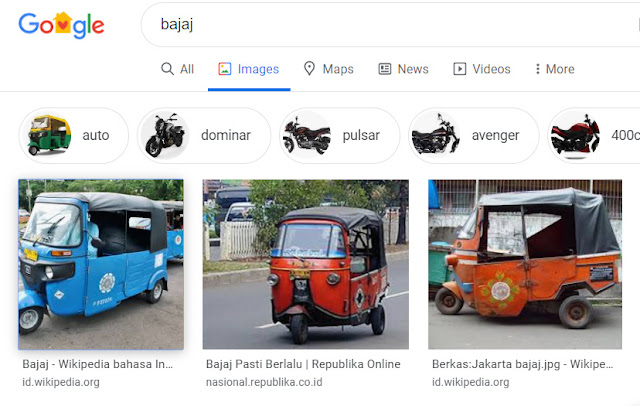- Get link
- X
- Other Apps
Posted by
Iman Prabawa
on
- Get link
- X
- Other Apps
Halo semuanya, apa kabar? Ketemu lagi sama saya, Iman Prabawa. This time, I will explain the meaning of ngeles in Indonesian. We will also be going to watch a scene from an Indonesian movie where this word is spoken.
And below is how to pronounce [ngeles aja].
And below is how to pronounce [ngeles aja kaya bajaj].
Next, let's watch examples where [ngeles] is used by Indonesians.
The conversation in that scene with English translation is as follows.
It was Dewo's fault, actually, because, at that time, his mind was full of a lot of problems; he forgot that the coffee being served to him was always served with sugar separated. But because he was the boss, he could say whatever he wanted.
If you have any questions regarding the Indonesian language, you can ask me directly. You can see how to do that on my About Me page.
If you are a beginner in the Indonesian language, you can learn step by step with My Lesson Here.
So, let's dive in!
The second meaning of ngeles is to cop out or make an excuse. This is what we're going to watch from the scene down below. This kind of meaning is not the first meaning.
For this second meaning, there is a popular in Indonesia using this word [ngeles]. The phrase is,
Bajaj is known as a vehicle in Indonesia that does a lot of maneuvering between cars, just like the motorbike. That's why we're referring to Bajaj when saying this phrase.
You can see this word being used in lots of news headlines. For example, this one from Detik.com
And this one, a headline from Warta Ekonomi.
Other examples sentences:
Ngeles In Indonesian
Ngeles can have two meanings. The first meaning of ngeles is to take a course. For example, you're taking an English course, and you say this to your friend.Gue cabut dulu ya? Gue mau ngeles Bahasa Inggris soalnya sekarang. (I've got to roll-out now because it's time for me to go to my English course now.)Actually, in this case, the basic word for this is [les]. You add the prefix [nge], and then it becomes [ngeles].
The second meaning of ngeles is to cop out or make an excuse. This is what we're going to watch from the scene down below. This kind of meaning is not the first meaning.
For this second meaning, there is a popular in Indonesia using this word [ngeles]. The phrase is,
Ngeles aja loe kaya Bajaj!If I translate this into English, the translation will roughly be this.
All you do is just coping out, just like Bajaj!Bajaj is a private commercial transport in Indonesia, just like a taxi, but cheaper in price. Bajaj looks like this.
Bajaj is known as a vehicle in Indonesia that does a lot of maneuvering between cars, just like the motorbike. That's why we're referring to Bajaj when saying this phrase.
You can see this word being used in lots of news headlines. For example, this one from Detik.com
And this one, a headline from Warta Ekonomi.
Other examples sentences:
- Jawab yang jujur dong! Jangan cuma ngeles doang. (Please, answer it honestly! Don’t just cop out.)
- Terus aja loe ngeles! Ngaku napa? Wong buktinya juga udah ada. (You’re always making an excuse. Why don’t you just confess? We’ve got all the proof.)
- Kamu ngeles Matematika di mana? (Where do you take the Math tutoring?)
Next, let's hear how to pronounce the word [ngeles].
How to Pronounce Ngeles
Here is how you pronounce [ngeles] in bahasa Indonesia.audio video
And below is how to pronounce [ngeles aja].
And below is how to pronounce [ngeles aja kaya bajaj].
Next, let's watch examples where [ngeles] is used by Indonesians.
Examples of Ngeles In Use
The first clip we are about to watch is taken from a movie called The East 9 (2015). Let's watch the clip below.The conversation in that scene with English translation is as follows.
Dewo: Kok pahit? He? Loe ngga pakein gula, ya? (Why is this coffee bitter? Hey? You didn't give sugar, did you?)
Office Boy: Kan seperti biasa, gulanya dipisah, mas. (As always, sir, I kept the sugar separated.)
Dewo: Ngeles aja, loe! (Ah, you’re just making an excuse!)In this scene, Dewo blames the office boy because the coffee feels bitter. But it's not the office boy's fault because he always keeps the sugar separated when serving the coffee to Dewo.
It was Dewo's fault, actually, because, at that time, his mind was full of a lot of problems; he forgot that the coffee being served to him was always served with sugar separated. But because he was the boss, he could say whatever he wanted.
Vocabulary From the Clip
[Kok] is used when you want to ask about something. For more about this, you can read my article here: Kok In Indonesian.
[Loe] is informal for [Anda] = you. For more about this, you can read my article here: Loe In Indonesian.
[Pakein] is the conversational way of saying [pakaikan] = put (something) in it.
[Seperti biasa] = as usual.
[Dipisah] = separated.
Read also: Biasa Aja in the Indonesian Language
So, I think that's all for now. If you have any questions regarding this topic, just comment in the comment section below, and I'll be happy to answer them.
I'll talk to you soon, and bye now.
So, I think that's all for now. If you have any questions regarding this topic, just comment in the comment section below, and I'll be happy to answer them.
I'll talk to you soon, and bye now.
- Get link
- X
- Other Apps
Hello, I'm Iman Prabawa a.k.a Pak Guru Iman. I love to share about languages. My Instagram, @iman_prabawa




Comments
Post a Comment